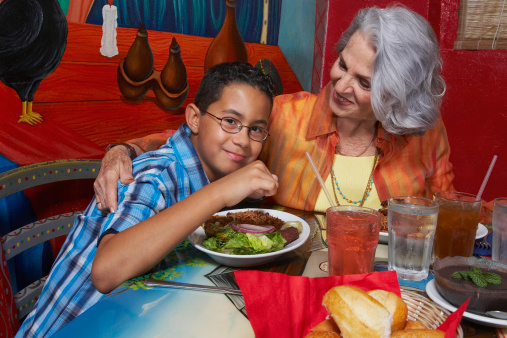As a pediatric nutritionist in a clinic that serves children with special needs, I see all kinds of family situations and all kinds of caregivers. Usually the primary caregiver is a parent. But for a variety of reasons, the primary caregiver may be a relative who cares for the child during much of the day or even has full legal custody of the child.
The latter can happen if both parents are incapable of caring for the child due to death, ill health, incarceration, mental illness or any number of other reasons. When a grandparent or related adult assumes legal custody and care of a child, it is referred to as “kinship care.”
 Custodial Grandparenting Is Serious Business
Custodial Grandparenting Is Serious Business
It sounds nice that a child continues to be cared for by a family member, and custodial grandparents often gladly and willingly assume the role. But kinship care can also present problems. One study found that half the custodial grandparents were caring for children with “emotional and behavioral problems.” This figure would not be out of line at the nutrition clinic of the Children’s Evaluation and Rehabilitation Center at Albert Einstein College of Medicine, given that we specialize in children with all sorts of special needs, including emotional and behavioral ones, but this study also noted that custodial grandparents may be less able to tend to the children’s psychoemotional needs.
Some grandparents assume custody because they feel obligated. Others may feel they are entitled to live life on their own and not as parents. Elderly people also have their own special health needs. They may want grandchildren as part of a senior lifestyle, but not as the main focus.
Why Is a Pediatric Nutritionist Writing About This?
When you deal with food, nutrition, eating and eating behavior, you also deal with caregivers’ lifestyles and emotions. It goes with the territory. When I ask a caregiver about everything a child eats for a day and the meal and snack schedule, and about diarrhea and constipation, it can break through emotional walls. Caregivers can make me privy to all manner of family dynamics. Many custodial grandparents have conflicting emotions and thoughts about their new role in a culture that has changed from when they raised their own children.
These factors can influence the approach custodial grandparents take to nutrition and feeding a child in their second time as “parents.” This has not been well studied, but one interesting qualitative study found that grandparents in Kansas now paid closer attention to issues of food safety and food expiration dates, and read labels more often. They felt that children spent too much leisure time doing sedentary activities and were adversely affected by their “on-the-go” lifestyles. The grandparents made more effort to include varied fruits and vegetables, but also acknowledged taking a more relaxed and even indulgent approach to feeding.
Still, as much as their focus on nutrition may have increased, the grandparents also admitted that this focus didn’t always translate into behavioral changes. While they might have more time to look at food labels and challenge their grandchildren’s screen time, they also noted having hectic schedules, which led to eating out more.
Nutrition Counseling for Custodial Grandparents
How does my counseling of custodial grandparents differ from what I might tell a biological parent? First, they need to feel that I particularly value their efforts. They’re doing a job for which they didn’t sign up and may not really want to do, despite loving their grandchildren.
Next, I look at where the positives are in the family diet and lifestyle. Grandparents will often have stable lives that have a routine. They’re used to having meals every day at the same time; they wake up and go to bed at the same times. Grandparents may be more likely to cook at home, have children eat more fruits and vegetables and eat as a family. If so, that needs to be encouraged. These routines can provide a feeling of security for children who have known serious family problems or had unstable lives.
If grandparents have catered too much to the whims of their grandchildren (grandparents often love to indulge them), I reinforce how maintaining their structured eating style is part of positive role modeling and talk about how to set limits with treats. The grandparents’ value is about more than the tangibles. They are valuable to their grandchildren because of who they are and what their life experiences have been. This can even be part of good conversation at mealtimes.
Custodial grandparents seem to increase their awareness of the role of nutrition in child development and are primed for making positive changes if provided some motivational nutrition counseling and simple tips that emphasize their strengths. Good grandparenting may not happen overnight, but it might happen over healthy and happy family dinners. The grandchildren are worth this effort, and the custodial grandparents are certainly worth mine.

